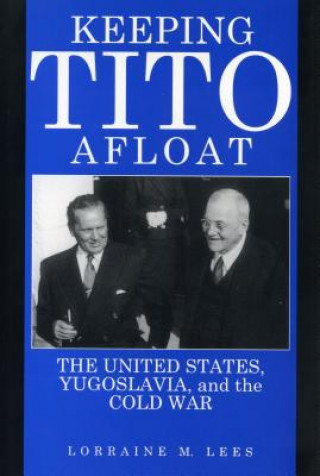
Kod: 04563970
Keeping Tito Afloat
Autor Lorraine M. Lees
""Keeping Tito Afloat offers the most comprehensive treatment of U.S.-Yugoslav relations during the Cold War. Lees has an excellent feel for the development of policy within the American government, and she provides insightful ana ... więcej
- Język:
 Angielski
Angielski - Oprawa: Miękka
- Liczba stron: 268
Wydawca: Pennsylvania State University Press, 1997
- Więcej informacji o książce

Zobacz książki o podobnej tematyce
-

Modern B-Tree Techniques
468.52 zł -

Limits of Thought
849.62 zł -

Guardians of the Revolution
106.97 zł -23 % -

Doing Fieldwork
330.61 zł -

Scandal in Kissing an Heir
47.84 zł -10 % -

Jericho
89.65 zł
Bon podarunkowy: Radość gwarantowana
- Podaruj bon o dowolnej wartości, a my się zajmiemy resztą.
- Bon podarunkowy dotyczy całej naszej oferty.
- Możesz wydrukować elektroniczny bon z e-maila a następnie przekazać go obdarowanemu.
- Ważność bonu wynosi 12 miesięcy od daty wystawienia.
Więcej informacji o Keeping Tito Afloat
Za ten zakup dostaniesz 119 punkty
 Opis
Opis
""Keeping Tito Afloat offers the most comprehensive treatment of U.S.-Yugoslav relations during the Cold War. Lees has an excellent feel for the development of policy within the American government, and she provides insightful analysis of the motives and actions of key people in the Truman and Eisenhower administrations. But the book is not simply focused on the U.S.; it offers valuable insight into Tito and his ability to resist American 'plans' for him.""-Wilson D. Miscamble, University of Notre Dame ""This account is the best single source on United States-Yugoslav relations during the Truman and Eisenhower years.""-Journal of American History Keeping Tito Afloat draws upon newly declassified documents to show the critical role that Yugoslavia played in U.S. foreign policy with the communist world in the early years of the Cold War. After World War II, the United States considered Yugoslavia to be a loyal Soviet satellite, but Tito surprised the West in 1948 by breaking with Stalin. Seizing this opportunity, the Truman administration sought to ""keep Tito afloat"" by giving him military and economic aid. President Truman hoped that American involvement would encourage other satellites to follow Tito's example and further damage Soviet power. However, Lees demonstrates that it was President Eisenhower and Secretary of State John Foster Dulles who most actively tried to use Tito as a ""wedge"" to liberate the Eastern Europeans. By the end of 1958, Eisenhower and Dulles discontinued this ""wedge strategy"" because it raised too many questions about the ties that should exist between communist, non-communist, and neutral states. As Tito shrewdly kept the U.S. at arm's length, Eisenhower was forced to accept Tito's continued absence from the Soviet orbit as victory enough. In the period between 1958 and 1960, Lees examines U.S. political objectives that remained after military support for Tito was discontinued. Although use of Yugoslavia as a wedge never fully succ
 Szczegóły książki
Szczegóły książki
Kategoria Książki po angielsku Society & social sciences Politics & government International relations
204.59 zł
- Pełny tytuł: Keeping Tito Afloat
- Autor: Lorraine M. Lees
- Język:
 Angielski
Angielski - Oprawa: Miękka
- Liczba stron: 268
- EAN: 9780271026503
- ISBN: 0271026502
- ID: 04563970
- Wydawca: Pennsylvania State University Press
- Waga: 408 g
- Wymiary: 154 × 229 × 24 mm
- Data wydania: 15. April 1997
Ulubione w innej kategorii
-

On Palestine
47.04 zł -14 % -

Prisoners of Geography
47.34 zł -23 % -

World Order
51.87 zł -23 % -

International Relations, Global Edition
424 zł -

Grand Chessboard
96.30 zł -

Diplomacy
78.97 zł -14 % -

Clash of Civilizations and the Remaking of World Order
73.63 zł -15 % -

Hundred-Year Marathon
86.83 zł -13 % -

The Spy and the Traitor
52.37 zł -15 % -

Understanding the Intelligence Cycle
310.87 zł -

Who Rules the World?
51.87 zł -23 % -

Who Rules the World?
48.95 zł -14 % -

Dead Aid
73.63 zł -5 % -

World Order
61.24 zł -15 % -

Adults In The Room
61.24 zł -15 % -

Legacy of Ashes
77.26 zł -14 % -

Evolution of Cooperation
81.39 zł -

Strategic Vision
70.41 zł -23 % -

Secret World
87.93 zł -14 % -

Geopolitics and Geoculture
93.17 zł -29 % -

Dawn of Eurasia
51.87 zł -23 % -

How Spies Think
52.37 zł -15 % -

Gaza in Crisis
51.87 zł -23 % -

Planetary Cycles Mundane Astrology
93.88 zł -

OVERTHROW : AMERICA'S CENTURY OF REGIME
109.49 zł -5 % -

Is the EU Doomed?
104.76 zł -

Righteous Victims
101.84 zł -4 % -

Directorate S
85.82 zł -4 % -

Europe's Border Crisis
176.28 zł -

America's Strategy in World Politics
326.38 zł -

Destroying Libya and World Order
94.28 zł -

amantes del fin del mundo
93.19 zł -

My Nationalist Pony
146.56 zł -

Critical Practices in International Theory
902.30 zł -

American Century and Beyond
101.63 zł -4 % -

Heroic Failure
48.95 zł -14 % -

Oxford Handbook of the European Union
225.44 zł -

Rise and Kill First
78.97 zł -14 % -

PEACE TO END ALL PEACE
98.51 zł -14 % -

Tragedy of Great Power Politics
95.79 zł -4 % -

Countdown to Zero Day
81.69 zł -5 % -

Revenge of Geography
84.31 zł -15 % -

Political Order and Political Decay
70.41 zł -23 % -

Naked Diplomat
61.14 zł -23 % -

Against Our Better Judgment
54.39 zł -

After the Empire
61.74 zł -

Legacy of Ashes
88.74 zł -23 % -

Dragons and the Snakes
136.29 zł -9 % -

Oxford IB Diploma Programme: Global Politics Course Book
265.44 zł
zadowolonych klientów
Od roku 2008 obsłużyliśmy wielu miłośników książek, ale dla nas każdy był tym wyjątkowym.
Copyright! ©2008-24 libristo.pl Wszelkie prawa zastrzeżonePrywatnieCookies



 21 milionów książek
21 milionów książek Dostawa 10.99 zł
Dostawa 10.99 zł (32) 444 93 66 (8-15.30h)
(32) 444 93 66 (8-15.30h)